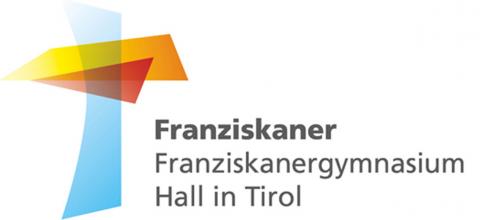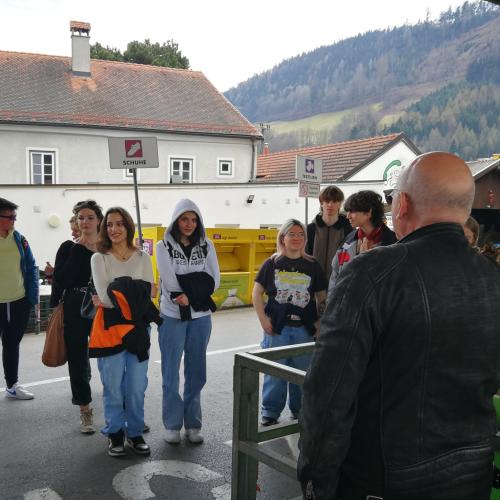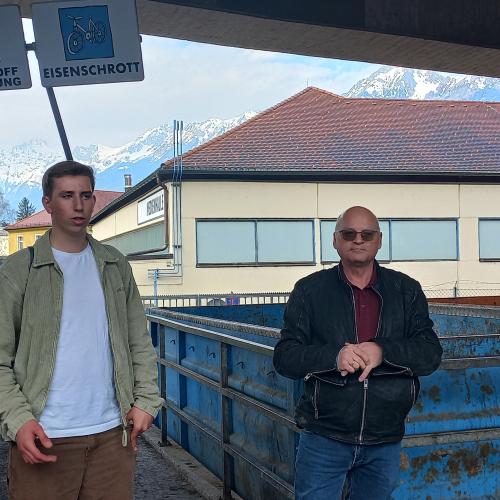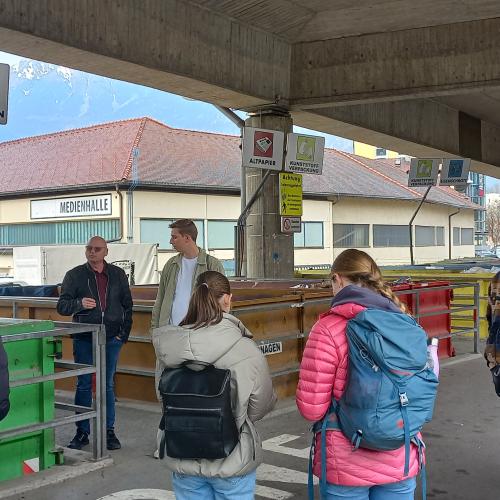7ab Erasmus+ return visit from Slovenia - The Recycling Yard of Hall
7ab Erasmus+ return visit from Slovenia
The Recycling Yard of Hall
On Friday, 24th of March 23, Michael Neuner from the environmental office of the town of Hall introduced the recycling yard. Due to the fact that we were four mixed groups of Slovenians and Austrians, all the content was translated into English by the students from the Franciscan Grammar school.
The recycling yard in Hall in Tirol is in charge for more than 7 500 households. Even if it seems to be for free, the money gets levied by a garbage fee which is charged per capita (per person). In order to prevent people from the surrounding area to dispose their litter here, the “Haller Bürgerkarte” was introduced, a card, which is only given to the citizens from Hall. Nowadays it is only possible to get into the recycling yard or one of the 70 collection stations with this card. This led to a reduction of garbage entries from 200000 to 45000 per year.
It is very important to avoid and to sort waste. If the waste is separated well the waste disposal gets much cheaper. For example, the disposal of non-recyclable rubbish costs around 240€ per ton. In contrast, when all the biodegradable part is taken out, it only costs around 30€. Whereas the total amount of waste rises every year, the contribution of the non-recyclable waste stayed the same due to the detailed separation. Therefore, the town of Hall has been able to keep waste taxes constant for the past 10 years. Altogether, the town pays around 9 million € each year for waste disposal.
Different types of waste collected at the recycling yard:
- Glass: Bottle glass and window glass do have different properties i.e. a different surface tension. Therefore they have to be collected separately.
- Green waste: Hummus is produced from green waste and used as a fertilizer for the flower beds of the town or given away for free for private use.
- Plastic waste: This includes all packaging materials made primarily of plastic, that are already taxed at the point of purchase, such as plastic bottles.
- Electronic devices: Disposal of electronic devices is free of charge as the waste taxes are already included in the purchase price of the new device.
- Metal: Metal is sold to a company which reuses them in new products.
- Paper and cardboard
- “Öli”: For vegetable oils, a container box called "Öli" is provided. Hall uses the oil for fuel production for cars and for electricity generation.
- Residual waste: Only materials which are not taxed at the point of purchase are thrown away as residual waste. This material that cannot be placed anywhere else. It is the most expensive waste, except for hazardous waste.
- Waste disposal site of hazardous waste: This site stores chemicals like coolants, cleaning acids and medicines (up to 5 tons/a). This costs around 6,000€ per ton.
A very useful invention is the “noamol-box”, a simple cardboard box, which can be filled with things that aren’t needed any longer. For instance, if someone has a functional alarm clock which he does not use any longer, he puts it in the “noamol-box” and another person can take and use it again (“no amol” is a Tyrolean expression for “once again”).
Our Slovenian guests were not convinced about the recycling of the plastic bottles though. They said that if they were paid the deposit when returning the bottles to the supermarket, this would be a greater personal motivation than handing in the bottles for free at the recycling centre. They are not alone in this argument: in order to increase the recycling rate of plastic bottles, a bottle deposit system will also be introduced in Austria in the coming years.
Concerning sustainability, the avoidance, the reuse and the recycling of materials is of fundamental importance - in this order. Residual waste should be minimized due to the need for disposal places. Hazardous waste is to be reduced in industrial processes as well as in everyday use. Remaining hazardous waste has to be collected and disposed of by experts in order to avoid a contamination of the environment and a subsequent uptake by living organisms like salad plants or mushrooms which serve as food for animals and human beings.
In conclusion, professional waste management including the avoidance, the reuse and the recycling of materials is a highly important topic of a city's sustainability strategy - a strategy where the citizens rely on the town and the town relies on the cooperation of the citizens, like in Hall in Tirol.
(continue to Visiting the Tourism School in Absam)
Text: Anna-Carina Holzer & Theresa Waldnig, 7a
Fotos: Ilka Prowatke, Irena Sladič (SLO)




